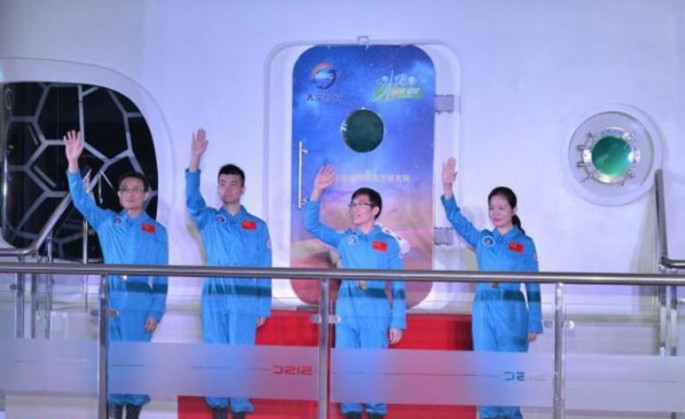Four Chinese volunteer "taikonauts" (astronauts) on Dec. 14 ended 180 days of confinement in a capsule simulating a spacecraft bound for Mars in China's own version of the international HI-SEAS experiment on Hawaii that ended last August.
The simulation, which took place in special facilities in Shenzhen City, tested technologies intended for deep space exploration missions beyond the Moon.
The three men and one woman (all volunteers) were selected from 2,110 candidates after the Astronaut Center of China launched a call for volunteers in May 2015. They are Wu Shiwen, Luo Jie, Tong Feizhou and Ms Tang Yongkang.
The volunteers will receive medical checks over the next few days to check on their health. Data collection will also continue inside the capsule over the next month to ensure the credibility of the data.
The volunteers lived in a 1,340 cubic meter sealed capsule with a floor space of 370 square meters for the past 180 days. They entered the capsule on June 17, 2015.
The experiment was designed to determine how well food, water and oxygen can be used and recycled under controlled conditions. The test of the "controlled ecological life support system" was inspired by technology currently used in China's Shenzhou spacecraft.
Officials said the project shed light on the physiological effects of a hermetic environment on humans and changes to human biological rhythms.
The project will accelerate China's progress into space, said Li Qinglong, deputy director of the Astronaut Center of China.
More than a dozen Chinese and overseas institutions have been involved in the project, including the Shenzhen-based Space Institute of Southern China, the Chinese Academy of Sciences, Harbin Institute of Technology, Harvard University and the German Aerospace Center.
The volunteers told Chinese official media they were exhausted and suffered both mentally and physically during the latter part of the test.
The volunteers cultivated 25 kinds of plants and tested 635 pieces of equipment.
One experiment recycled all of the oxygen and water in the capsule and part of the food for the four volunteers. Tests on nutrition, hygiene, work and rest in space were completed.
The project's technical chief, Li Yinghui, said the experiment was "a complete success."



























